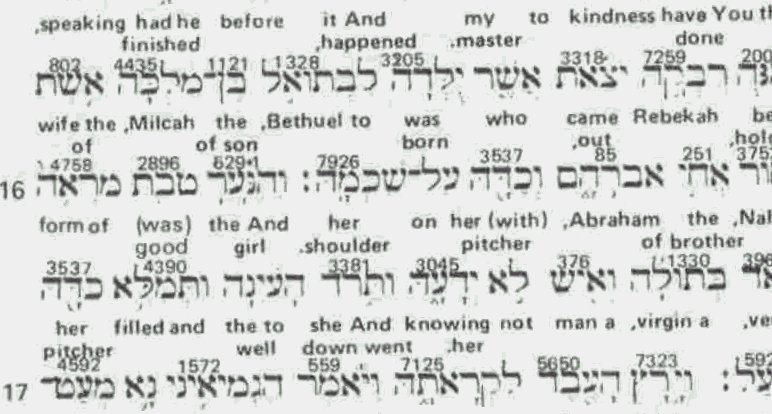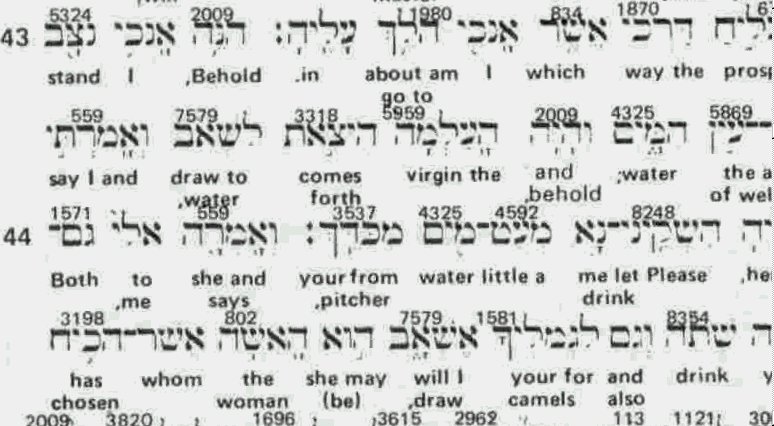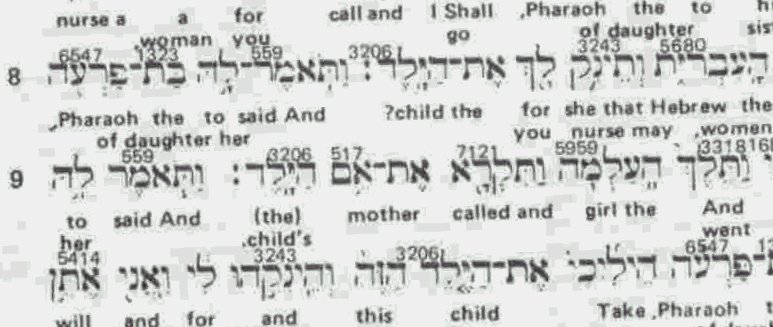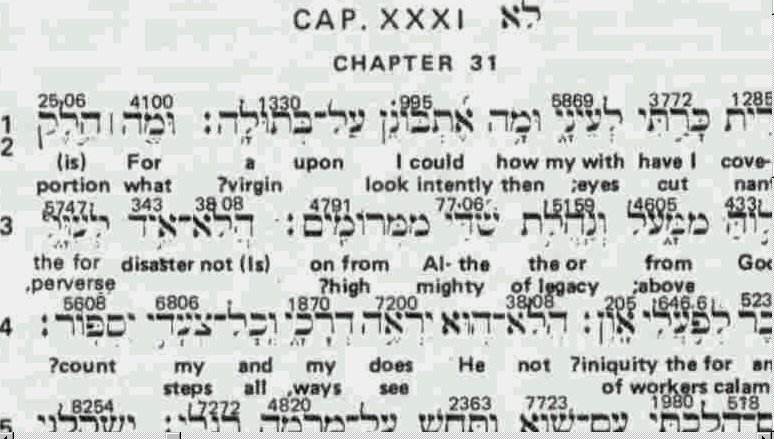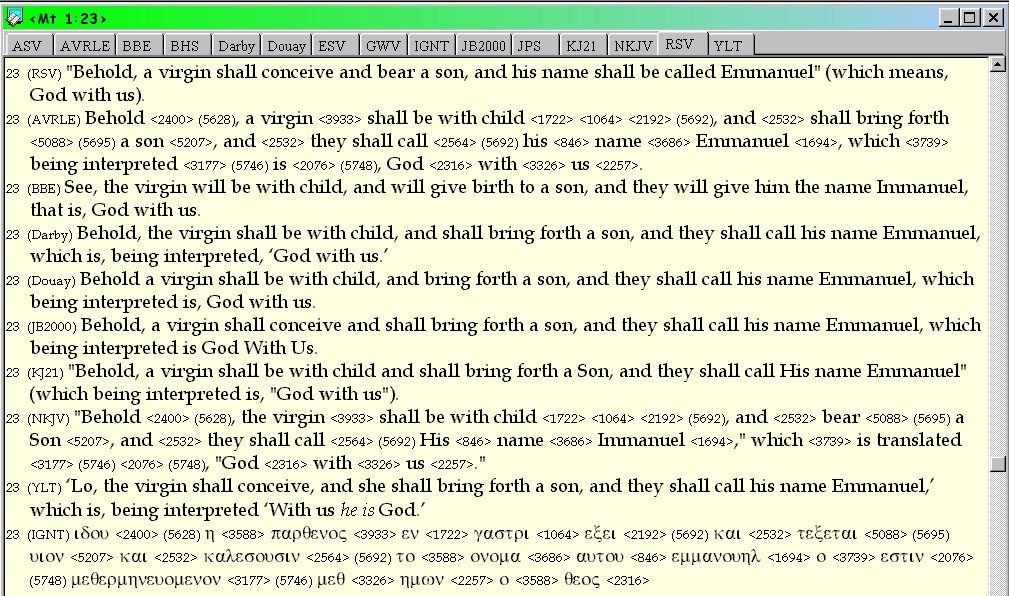
but also the record of Luke 1:35 in view of the following:
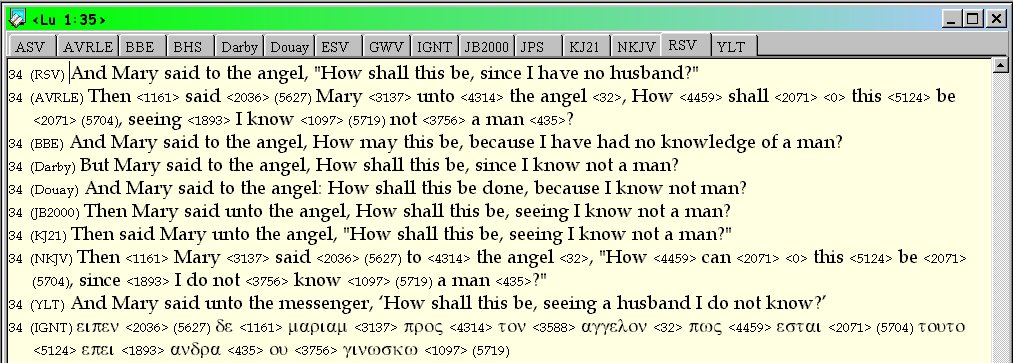
In determination of paternity lawsuits, the identity of the father of the child in question is vital for both determining name assignment, responsibility for childcare in all its forms, and allotment of inheritance.
The testimony of the mother, whether honestly and accurately noted and recorded by a human male or female, is to be considered, being that the mother obviously has most intimate involvement in the determination of who impregnated her - whether she recognizes the impregnator by known or assumed name, by face recognition only, and/or by DNA testing of some parts of the bodies in question.
Recorded in Judeo-Christian Scripture, there seemed to be both prejudicial misunderstanding and perceptive enlightenment portrayed by the following verses:
John 8:1 But Jesus went to the Mount of Olives.
8:2 And early in the morning He came again into the temple, and all the people came to Him. And He sat down and taught them.
8:3 And the scribes and Pharisees brought to Him a woman taken in adultery [ they might have hypocritically been lurid and lewd peeping Toms enjoying the presumed X-rated sights ]. And standing her in the forefront,
8:4 they said to Him, Teacher, this woman was taken in adultery, in the very act.
8:5 Now Moses in the law commanded us that such should be stoned. You, then, what do you say?
8:6 They said this, tempting Him so that they might have reason to accuse Him. But bending down, Jesus wrote on the ground with His finger, not appearing to hear.
8:7 But as they continued to ask Him, He lifted Himself up and said to them, He who is without sin among you, let him heave [ or: throw but not necessarily: "cast" ] the first stone at her.
8:8 And again bending down, He wrote on the ground.
8:9 And hearing, and being convicted by conscience, they went out one by one, beginning at the oldest, until the last [ I told you that they enjoyed the X-rated show, or similar ]. And Jesus was left alone, and the woman standing in the forefront.
8:10 And bending back up, and seeing no one but the woman, Jesus said to her, Woman, where are the ones who accused you? Did not one give judgment against you?
8:11 And she said, No one, Lord. [ "Lord?" What kind of a penitent believer would call Him that? ] And Jesus said to her, Neither do I give judgment. Go, and sin no more. [The operative words are: "sin NO MORE" and note that Jesus did not ask her phone number with a promise: "I will see you later, babe."]
8:12 Then Jesus spoke again to them, saying, I am the Light of the world. He who follows Me shall not walk in darkness, but shall have the light of life.
8:13 Therefore [ and now it is Credentials Time, Time for Paternity Analysis ] the Pharisees said to Him, You bear record concerning yourself, your witness is not true.
8:14 Jesus answered and said to them, Though I bear record concerning Myself, My witness is true. For I know from where I came, and where I go. But you do not know from where I came, and where I go.
8:15 You judge after the flesh, I judge no one.
8:16 And yet if I do judge, My judgment is true; for I am not alone, but I and the Father who sent Me.
8:17 It is also written in your law that the testimony of two men is true.
8:18 I am one who bears witness of Myself, and the Father who sent Me bears witness concerning Me.
[ POINT OF INTEREST REGARD VERSE 18:
Matthew 3:17 And wow, a voice from Heaven, saying: "This is My beloved Son, in whom I am well pleased."
Matthew 17:5 While he yet spoke, hey, a bright cloud overshadowed them. And hey, a Voice out of the cloud who [ not "which" ] said: "This is My beloved Son in whom I am well pleased, hear Him."
Mark 1:11 And there came a Voice from Heaven, saying: "You are My beloved Son, in whom I am well pleased."
Mark 9:7 And there was a cloud that overshadowed them. And a Voice came out of the cloud, saying: "This is My beloved Son. Hear Him."
Luke 3:22 And the Holy Spirit came down in a bodily shape, like a dove on Him. And a voice came from Heaven, who [ not "which" ] said, You are My Son, the Beloved; I am delighted in You."
Second Peter 1:17 For He received honor and glory from God the Father, when was borne to Him a Voice from The Excellent Glory, "This is My beloved Son, in whom I am well pleased."
Second Peter 1:18 we heard this Voice borne from Heaven, for we were with Him on the holy mountain [of Transfiguration].
Second Peter 1:19 And we have the prophetic word made more sure. ]
continuing on:
8:19 Then they said to Him, Where is your father? Jesus said to them, You neither know Me nor My Father. If you had known Me, you would have known My Father also.
8:25 Then they said to Him, Who are you? And Jesus said to them, Even the same which I also say to you.
8:31 Then Jesus said to the Jews who believed on Him, If you continue in My word, you are My disciples indeed.
8:32 And you shall know the truth, and the truth shall make you free.
8:33 They answered Him, We are Abraham's seed and were never in bondage to anyone [ including Pharaoh in Egypt, Nebuchadnezzar of Babylon, and Adolf Hitler in Nazi Germany ]. How do you say, You will be made free?
8:34 Jesus answered them, Truly, truly, I say to you, Whoever practices sin is the slave of sin.
8:35 And the slave does not reside in the house forever, but the Son resides forever.
8:37 I know that you are Abraham's seed, but you seek to murder Me because My Word has no place in you.
8:38 I speak what I have seen with My Father, and you, then, do what you have seen with your father.
8:39 They answered and said to Him, Abraham is our father. Jesus answered them, If you were Abraham's children, you would do the works of Abraham.
8:40 But now you try to murder Me, a man who has told you the truth which I have heard beside God; this Abraham did not do.
8:41 You do the deeds of your father. Then they said to Him, We are not born of fornication [like you were, and we do not believe the gossip that "the Holy Spirit" impregnated your mommy Mary instead of impregnation by your daddy Joseph]; we have one father, even God.
8:42 Jesus said to them, If God were your father, you would love Me, for I went forth and came from God; for I did not come of Myself, but He sent Me.
8:43 Why do you not know My speech? Because you cannot hear [even with audible-enabled ears] My word.
8:44 You are of the Devil as father, and the lusts of your father you will do. He was a murderer from the beginning, and did not reside in the truth because there is no truth in him. When he speaks a lie, he speaks of his own, for he is a liar and the father of it.
8:45 And because I tell you the truth, you do not believe Me.
8:46 Which of you convicts Me of sin? And if I say the truth, why do you not believe Me?
8:47 He who is of God hears God's words. Therefore you do not hear them because you are not of God.
8:48 Then the Jews answered and said to Him, Do we not say well that you are a [ half-breed Gentile illegally mixed into the pure-race blood descendancy of Jacob ] Samaritan and have a demon?
8:49 Jesus answered, I do not have a demon, but I honor My Father, and you dishonor Me.
8:50 And I do not seek My own glory, but there is One who seeks and judges.
That "born of fornication" accusation of the hell-bound disbelieving 'jewish' and willfully-ignorant pharisees is intriguing. Flies in the face of:
Matthew 1:23 "Hey, the [ "the?" ] virgin shall conceive in her womb, and will bear a [gender-specific] son. And they will call His name Emmanuel," which being interpreted is, God with us.
Luke 1:6 And in the sixth month [ our Julian/Gregorian-calendar equivalent of June and so no wonder we traditionally celebrate Christmas in December? ] the angel Gabriel was sent from God into a city of Galilee, named Nazareth,
1:27 to a virgin betrothed [i.e. more-than-engaged married but not yet "consummated" sexually with or without a celebration wedding occurring first or later on] to a man whose name was Joseph, of the house of David. And the virgin's name was Mary.
1:28 And the angel came in to her and said, "Howdy, one receiving grace, the Lord is with you. Blessed are you among women."
1:29 And when she saw him, she was troubled at his saying, and considered what kind of greeting this might be.
1:30 And the angel said to her, Do not fear, Mary, for you have found favor with God [ whether or not you were sensually seeking it ].
1:31 And hey, you shall conceive in your womb and bear a [ male ] son [ not an inferior-gender daughter ], and you shall call His name JESUS.
1:32 He shall be great and shall be called the Son of the Highest. And the Lord God shall give Him the throne of His father David.
1:33 And He shall reign over the house of David forever, and of His kingdom there shall be no end.
1:34 Then Mary said to the angel, How shall this be, since I do not know a man [ "Know" a man? How about "bodily sexualize most intimately" with a man instead? ]
1:35 And the angel answered and said to her, The Holy Spirit shall come on you [ whatever that means ], and the power of the Highest shall overshadow you [ a weird substitute action for genitalizing you with or without reference to the f-word ]. Therefore also that Holy One who [and not "which"] will be born of you shall be called Son of God.
1:36 And hey, your cousin Elizabeth also conceived a son in her old age. And this is the sixth month with her who was called barren [ or sterile, if you prefer ].
1:37 For with God nothing shall be impossible.
1:38 And Mary said, "Hey, the servant of the Lord. Let it be to me according to your word. [ And I guess that that emancipates womanhood or at least compensates and makes up for stupid Eve letting Satan coax her into choosing not abortion homicide but rather to stuff the Forbidden Fruit of Eden into the big hole under her nose ]. And the angel departed from her.
Also fascinating is the very-"explicit" reference to Mary being a "virgin" according to the New-Testament-cited prophecy:
Matthew 1:18 Now the birth of Jesus Christ took place in this way. When his mother Mary had been betrothed [ married but not yet "consummated" ] to Joseph, before they came together [ i.e. mutually genitalized ] she was found to be pregnant of the Holy Spirit;
1:19 and her husband (not "fiancee") Joseph, being a just [ honest and trustworthy ] man and unwilling to put her to shame [ because there was no proof from any man on Earth of fornication being committed by her, and any accusation of such from anyone could have resulted in Mary acquiring a huge sum of money in a defamation-and-slander lawsuit within the highest of Roman courts ], resolved to divorce her quietly [ for which Mary could have sued him for groundless unlawful desertion ].
1:20 But as he considered this, hey, an angel of the Lord appeared to him in a dream, saying, "Joseph, son of David, do not fear to take Mary your wife, for He who [ NOT "that, which" unless you are into using fetal-aborticide mis-wording ] is conceived in her is of the Holy Spirit;
1:21 she will bear a son, and you shall call His name Jesus, for He will save His people from their sins."
1:22 All this took place to fulfill what the Lord had spoken by the prophet:
1:23 "Hey, a virgin shall conceive and bear a son, and His name shall be called Emmanuel" (which means, God with us).
1:24 When Joseph woke from sleep, he did as the angel of the Lord commanded him; he took his wife,
1:25 but knew [ mutually genitalized ] her not until she had borne a son [ after which he probably mutually genitalized with her quite a bit, according to the mention of his siblings in Mark 3:32 and Luke 8:20 ]; and he called His name Jesus.
The above actually and historically happened according to:
Luke 2:7 And she [Mary] gave birth to her first-born son [ "FIRST-born," after who came the second and the third-born sons according to the mention of His siblings in Mark 3:32 and Luke 8:20 ] and wrapped Him in swaddling cloths [hopefully silky soft cotton instead of scratchy wool or hot polyester], and laid Him in a manger
[ animal cradle ], because there was no place for them in the inn.
So, getting back to the verse:
Matthew 1:22 All this took place to fulfill what the Lord had spoken by the prophet:
Matthew 1:23 "Hey, a virgin shall conceive and bear a son, and his name shall be called Emmanuel" (which means, God with us).
One Baptist theologian pointed out that the death and resurrection of Jesus Christ MUST be accompanied by Christ's virgin birth to qualify Jesus as World Savior of Penitent Sinners -- not merely on the basis of Christ's blood-descendancy maternal Jewish geneology as The Son of Man relating to mother Mary detailed in Luke chapter three and step-father Joseph's blood-descendancy paternal Jewish geneology detailed in Matthew chapter one . . . but also on the basis of a sin-free Divine Paternatage from and of The Holy Spirit [part of the Triune Godhead] Himself, as that Jesus is elaborated upon as The Creator of Earth and Universe in both Colossians chapter one and Hebrews chapter one in the New Testament of the Sacred-66-books Judeo-Christian (Old-and-New-Testaments) Holy Bible.
The Greek word for "virgin" is parthenos - and it always, ONLY means: virgin - whether a male or female human virgin. And in the case of the context of a virgin "conceiving in the womb," the gender of the virgin is obviously a female human and not a male human.
The source for such Matthew chapter one word "virgin" is NOT Isaiah 7:14 which reads:
Isaiah 7:10 Again the LORD spoke to Ahaz,
7:11 "Ask a sign of the LORD your God; let it be deep as Sheol or high as heaven."
7:12 But Ahaz said, "I will not ask, and I will not put the LORD to the test."
7:13 And he said, "Hear then, house of David! Is it too little for you to weary humans, that you weary my God also?
7:14 Therefore the Lord Himself will give you a sign. Hey, a young woman [the RSV and some other modern English-language renders the Hebrew word almah there: "young woman" for causes to be elaborated upon later] shall conceive and bear a son, and shall call his name Immanuel.
7:15 He shall eat curds and honey when he knows how to refuse the evil and choose the good.
7:16 For before the child knows how to refuse the evil and choose the good . . .
[ Romans 9:11 though they were not yet born and had done nothing either good or bad, in order that God's purpose of election might continue, not because of works but because of his call . . . ]
....the land before whose two kings you are in dread will be deserted.
Specifically, Isaiah 7:14 does not contain Strong's English-lettered Hebrew-text Word# 1330 for "virgin", but instead contains Strong's Word# 5959 for: [an-obviously-female] young woman.
Again, for Strong's Word# 5959 used in Isaiah 7:14 the RSV has it properly translated: "young woman" but which the KJV got incorrect using the term: "virgin".
Concerned theologians (including yours truly) wonder that being Isaiah 7:14 only refers to a "young woman" conceiving" how can that particular passage be the prophesied source of the prediction in Matthew 1:23 referring instead to a virgin: "[already being] with child"?
It is quite clear, according to the New Testament of The HOLY BIBLE, that the earthly mother of Jesus - namely, Mary - was not merely a maid or young woman, but (quite frankly).....a bonafide and actual virgin - sexually.
The word "virgin" is not to be relegated by demented, warped, twisted-nutcase heretics to whatever far-out and off-the-wall similes, metaphors, allegories, or symbols supposedly representing something or someone other than exactly and only what the typical dictionary definition is regarding that certain particular characteristic of a female human described as a bodily-sexual: "virgin," which is: virginity.....and NOTHING else!
Such is non-mistakably obvious regarding the record of Matthew 1:23 in all the listed English Bible translations and the inerrant Scrivener/Trinitarian Greek Text shown below:


Plainly from basic rational and reasonable logic, all younger-women virgins are younger women, but not all younger women are younger-women virgins, with the dictionary definitions of the word "virgin" applying when in agreement with the overall canonical-Scriptural definitions of "virgin."
Such a crucial distinction is vital for a proper understanding of the Lord's will pertaining to whether the words "younger widows" should be used for the correct English-language rendition of First Timothy 5:14 or rather the KJV words "younger women" are instead appropriate:
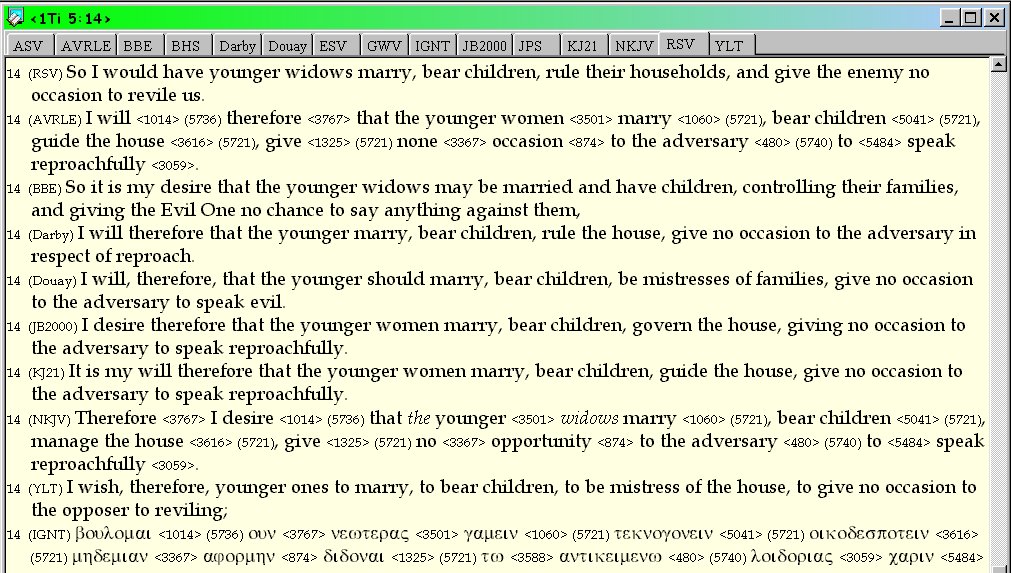
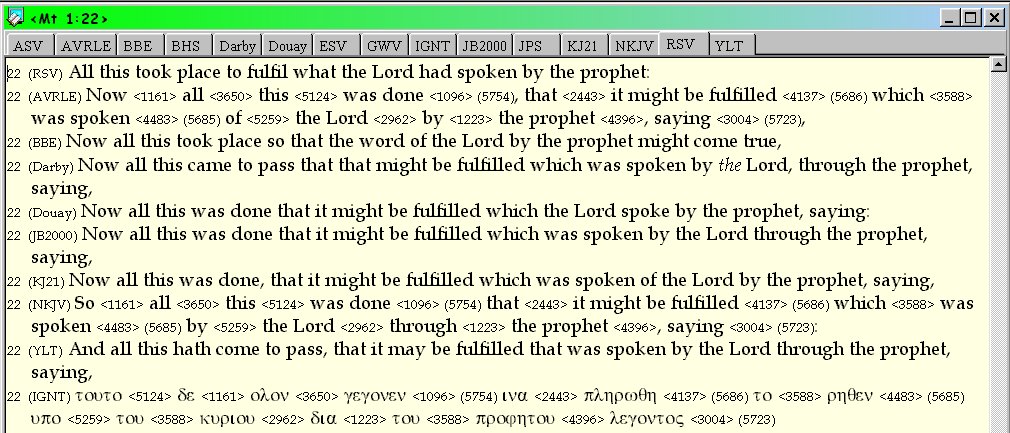
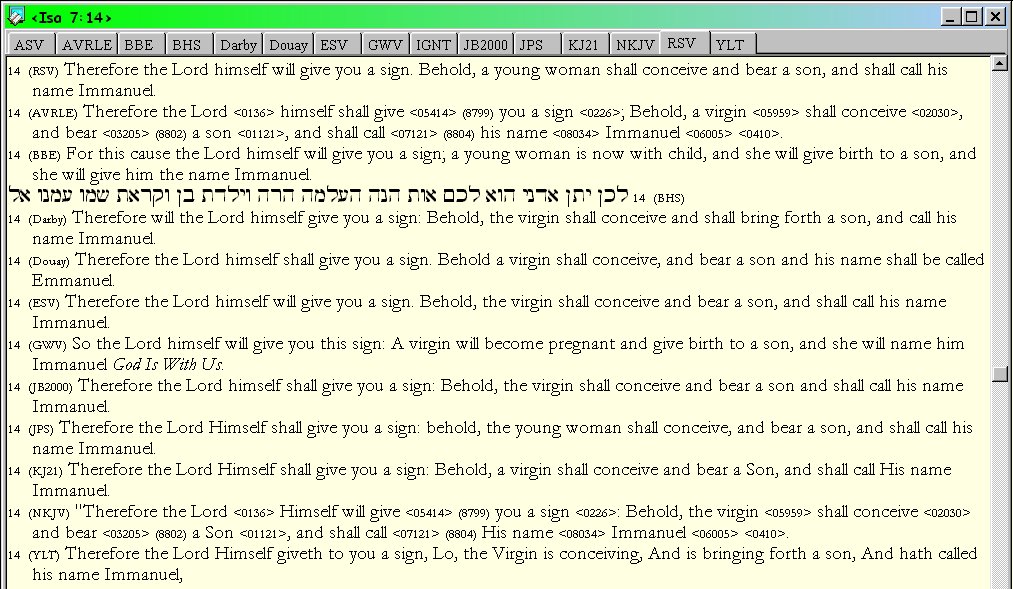
Every English translation portrayed for Isaiah 7:14 above - except the RSV, BBE, and JPS - displays the word "virgin" associated with Strong's word number 5959.....leading one to quickly conclude that "the majority rules," and the three discrepant translations mentioned above are errant aberrations concerning at least this particular passage of Scripture (for whatever cause and not reason).
However, let's see if some seemingly-"non-errant" questionably-"infallible" English
[mis-?] translations consistently have 5959 translated "virgin" . . . or apply some other Strong number to the word "virgin."
First considered is Genesis 24:16:
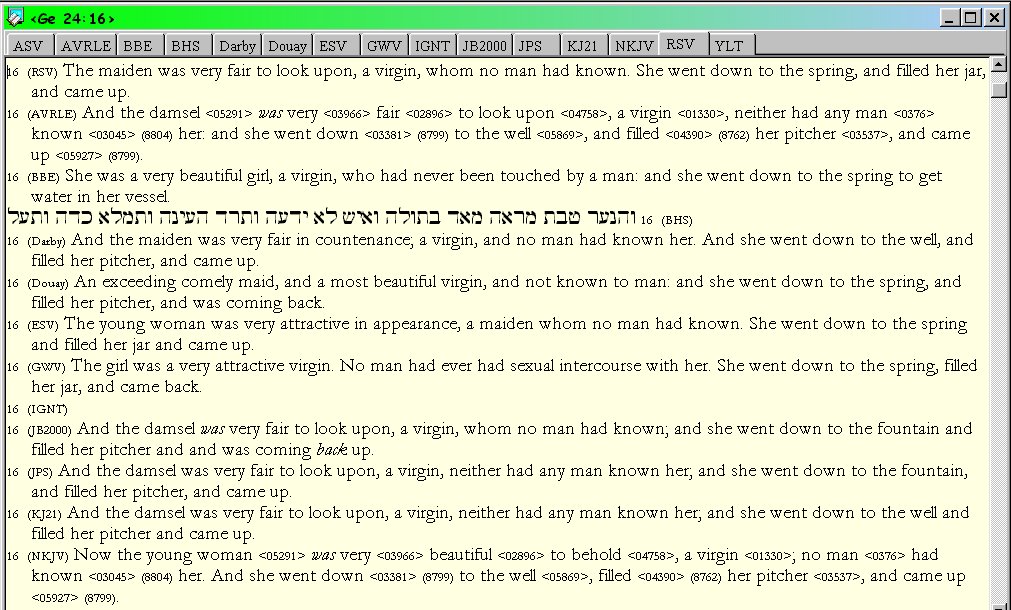
Not only are there a semantically-sloppy conglomeration of imprecisely-different words used in the translations above (e.g. young woman, maid, maiden, damsel, etc.), but the AVRLE (i.e. the Authorized Version [a.k.a. King James] Red Letter Edition) and the NKJV (new King James Version) have that word "virgin" instead associated with Strong's word-umber 1330 and NOT Strong's word-number 5959!.
As stated: "Oh oh."
And most every translation shown above does have the word: "virgin" (or euphemistic equivalent) for that verse.
So ARE there two DIFFERENT Hebrew words for "virgin?"
Maybe Strong meant to number one exactly-lettered Hebrew word for "virgin" as 1330 but mistakenly applied the number 5959 instead in that case . . . or rather is there another or alternative or additional word for "virgin" ALSO?
Sarcastically speaking, do not the precise and exact English alphabet letters: e l e p h a n t mean pretty much the same thing as the precise and exact English alphabet letters: a l a b a s t e r OR o r a n g e? Can they obviously not be considered synonymous?
So how can there be TWO different precisely-lettered Hebrew words for "virgin?"
What is obvious is that there is a serious problem there!
The next passage is Genesis 24:43:
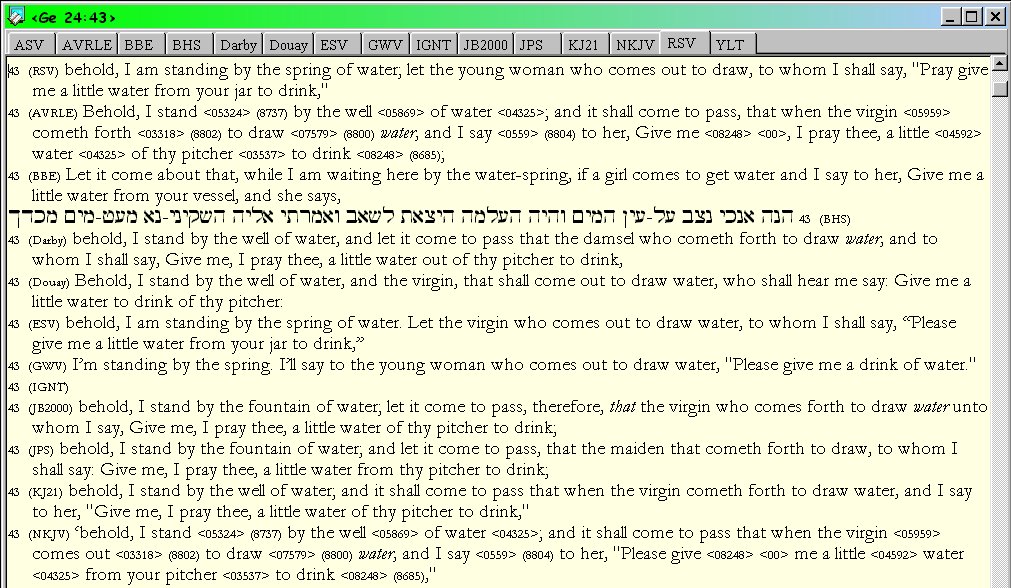
Now we have all sorts of words - some intrinsically and wildly-discrepant against the others - for the selected inferior-gendered person referred to in the Scriptural passage (e.g. young woman, virgin, girl, and damsel).
Of course, "damsel" and "girl" could be considered somewhat synonymous, although there is only one best English word to use which the present Body of Christ should agree upon for non-confusing unity....whether that is: "damsel" or instead (and not including): "girl." [And "damsel" is pathetically archaic and silly-sounding for modern usage].
The word "maiden" - however - is in a significantly DIFFERENT category (even though it is remotely but NON-applicably and NON-directly related to the word "girl").....in that "maiden" refers to a probably-younger "maid," which specifically implies servitude of some female-gendered human person.
NOTE: In strange non-explainable reversal, the AVRLE and NKJV in the Genesis 24:43 passage are back to associating Strong word number 5959 instead of Strong word number 1330 with the word "virgin."
Why?
WHY is the word "virgin" back to Strong's word# 5959 and not Strong's word# 1330 -- which new latter number (1330) they then associate with the word "virgin?"
At this point, it again behooves the reader to not be tempted to dismiss all this extremely-detailed and very-narrowly-focused Bible study as "a hang-up" or "obsession" or "trifles" or "missing the overall point" or "tedious nitpicking."
Remember what was stated earlier pertaining to that:
Plainly from basic rational and reasonable logic, all younger-women virgins are younger women, but not all younger women are younger-women virgins, with the dictionary definitions of the word "virgin" applying when in agreement with the overall canonical-Scriptural definitions of "virgin." Such a crucial distinction is vital for a proper understanding of the Lord's will pertaining to whether the words "younger widows" should be used for the correct English-language rendition of First Timothy 5:14 or rather the KJV words "younger women" are instead appropriate:

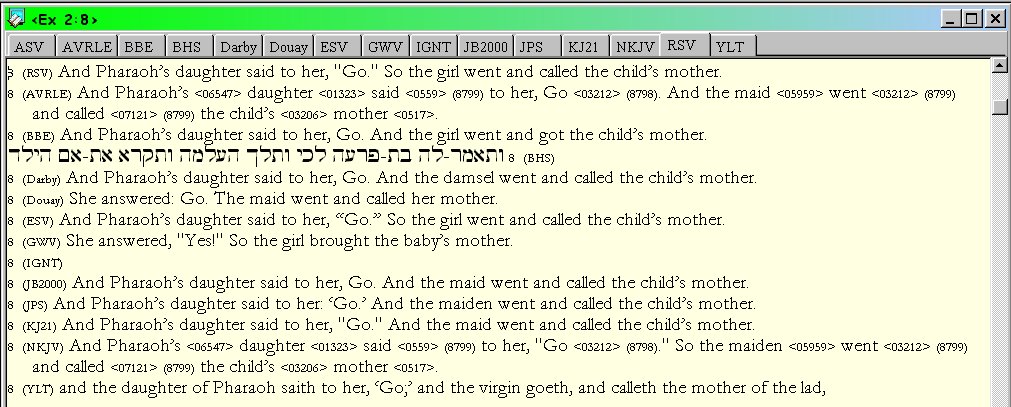
Both the AVRLE and the NKJV are this time associating Strong's word number 5959 with the word "maid" (in the case of the AVRLE) and the word "maiden" (in the case of the NKJV)!
Oh oh. Definite contradiction!.
Remember that the AVRLE and NKJV had Strong's word-number 1330 associated with the word "virgin" for Genesis 24:16. Then for Genesis 24:43 they had Strong's word-number 5959 associated with the word "virgin." Now in Exodus 2:8 they have Strong's word-number 5959 associated with the words "maid" and "maiden!"
Whoa!
One final passage considered is Job 31:1:
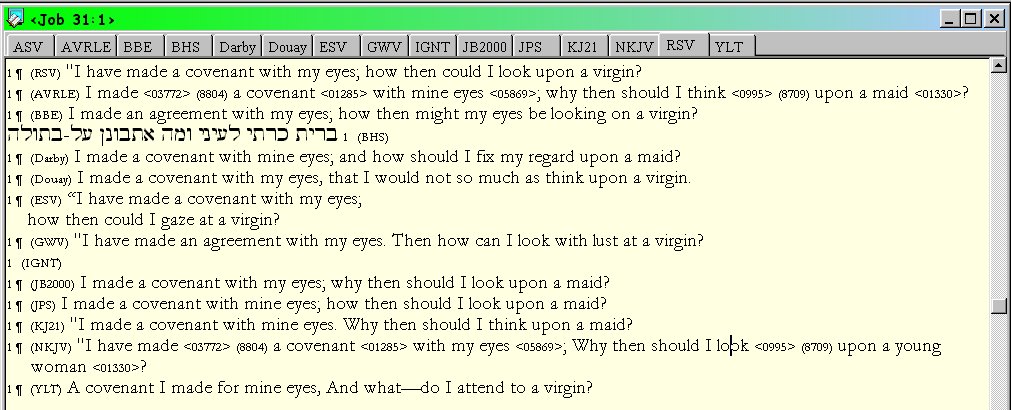
This time the AVRLE is back to associating Strong's word number 1330 with the word: "maid" and the NKJV for the first time associates that number with the words: "young woman."
Oh my.
Now, notice in ALL the passages shown above, the RSV [Revised Standard Version] ALWAYS associates Strong's word number 1330 with "virgin" while ALWAYS associating Strong's word number 5959 with "young woman" or "girl"!
At least the incorrect-in-this-case RSV is consistent pertaining to that in their Old-Testament rendition.
Expedient it is to once again employ brute logic to insure correct understanding of what is transpiring here:
Close examination of the differences in Hebrew alphabet lettering between Strong's word# 1330 compared with Strong's word# 5959 reveals whether or not Strong's numbering system is embarrassingly somewhat errant or capricious. But certainly
Strong was correct in giving completely different identification numbers to two completely-differently-lettered Hebrew words - in spite of the obviously-somewhat-errant discrepant bible translations applying the same word "virgin" to those two DIFFERENT Strong numbers!
Clearly and obviously, would it not be absurd that there are two different Strong word numbers for our one-and-only six-lettered (and only 6-lettered!) English word: virgin?
At this point, it again behooves the reader to not be tempted to dismiss all this extremely-detailed and very-narrowly-focused Bible study as "a hang-up" or "obsession" or "trifles" or "missing the overall point" or "tedious nitpicking."
ARE there two different kinds or types of never-had-sexual-intercourse female "virgins?"
And WHAT would those be?
The English-words-translated interlinear Hebrew-English segments below give an interesting answer.
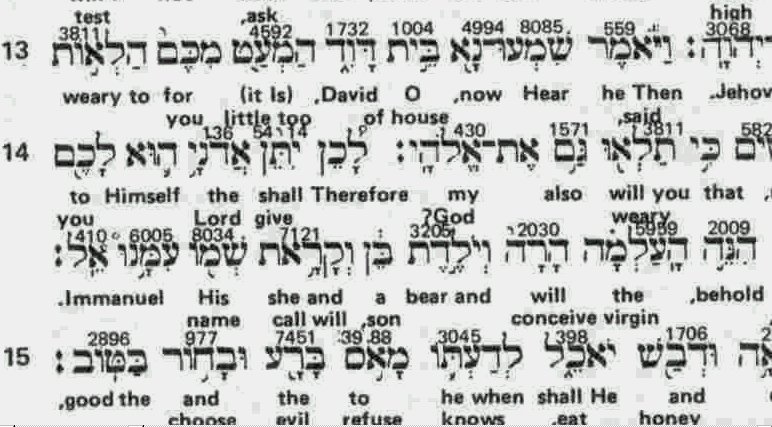
In our English language, there are such things as synonymns -- but which are different-lettered words meaning somewhat of the same thing. For example, the three-lettered English word: "sea" is generally considered to mean any body of water on the planet larger than a lake of whatever size . . . whereas the five-lettered English word: "ocean" always and only means a HUGE body of water (e.g. the Pacific ocean, the Atlantic ocean, etc.)
As previously stated, synonymns have an entirely different set of alphabet letters compared to each other, and thus would not two very different Strong numbers be required for each of them?
TRICK QUESTION: With that info established, which English translation: the RSV, or instead the AVRLE, is correct for Isaiah 7:14?
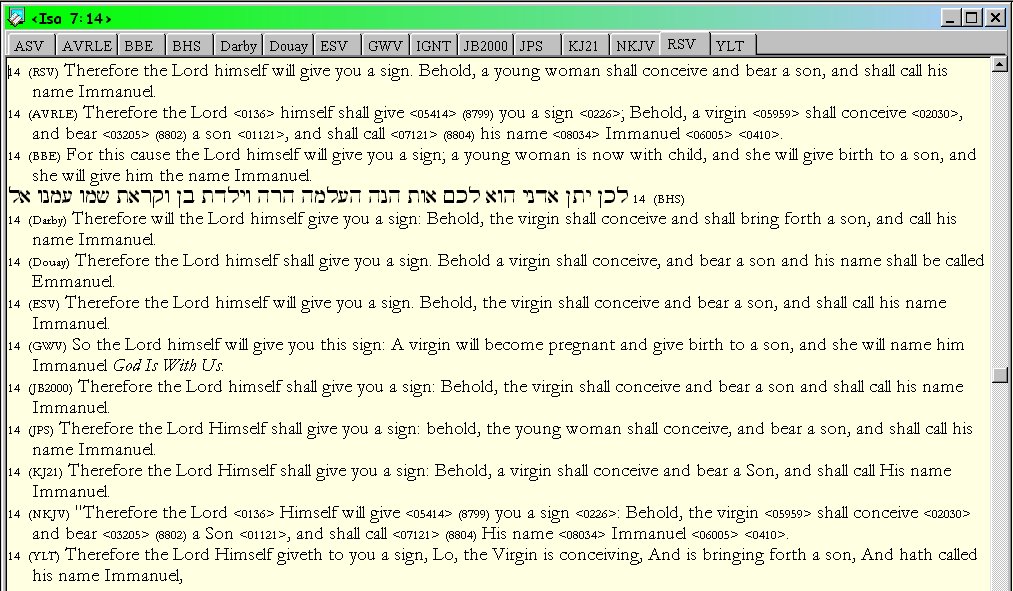
If you, the inquisitive independent-study scholar, need more enlightenment and verification, compare the exact English word discrepancies in the following passages of:
Genesis 24:16 (whether or not Rebekkah should be called a "virgin" for Strong's Word# 1330)
Genesis 24:43 (whether or not Rebekkah should be called a "virgin" for Strong's Word# 5959 instead, or in addition)
Exodus 2:8 (whether or not Moses' sister should be called a "girl" for Strong's Word# 5959)
Job 31:1 (whether or not the gal mentioned should be called a "virgin" for Strong's Word# 1330)
Isaiah 7:14 (whether or not the gal mentioned should be called a "virgin" for Strong's Word# 5959)
taken from an interlinear Hebrew-Greek-English Bible displaying the inerrant ben-Ashur Masoretic Hebrew Text of the Old Testament edited by Jay P. Greene published by Hendrickson Publishers of Peabody Massachusetts:
